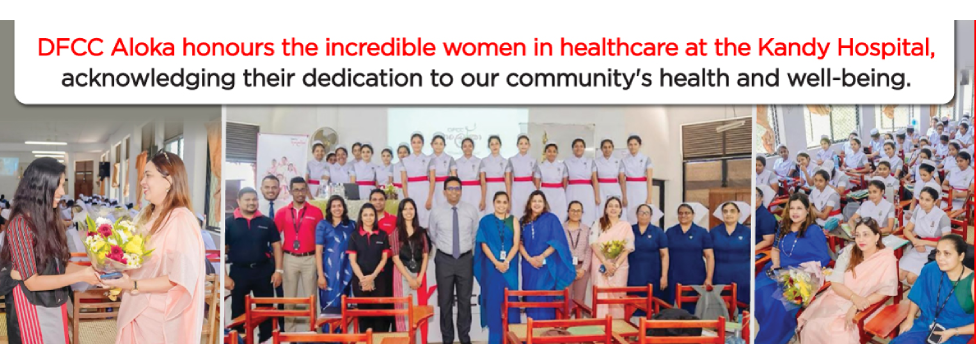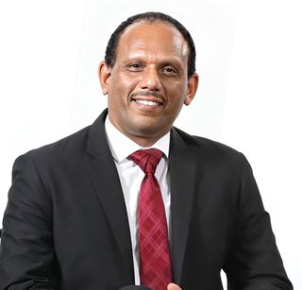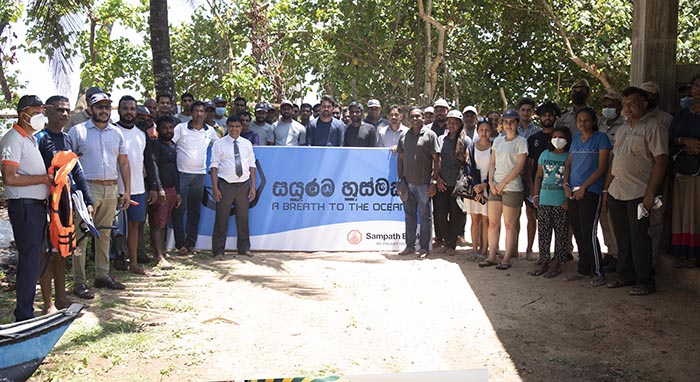Sri Lanka’s coral reefs are in a state of crisis, damaged as they are by climate change. The good news is that scientists have verified that corals are incredibly resilient--corals grown in nurseries can replicate themselves once transplanted in new surroundings. To this end, Sampath Bank’s coral restoration project involves underwater coral farming and sending trained scuba divers into the ocean’s depths to transplant the new clusters of coral.
“Being a responsible enterprise that takes pride in its Sri Lankan roots, Sampath Bank is committed to championing environmental sustainability. Sri Lankans have a tradition of living in harmony with nature. The desire to conserve natural resources is ingrained in our culture, and these days there’s a heightened awareness of a crisis in the natural world,” said Nanda Fernando - Managing Director, Sampath Bank PLC. “Our coral reefs and mangrove wetlands are powerful tourist magnets. They are environmental assets under threat from global warming. As an island nation that depends on tourism, we cannot afford to let this happen. To put it bluntly, livelihoods are at stake. More Sri Lankans are starting to grasp this, and that’s a net positive.”
“As the world struggles with environmental issues caused by the despoilation of natural resources, business enterprises have partnered with international organizations to prevent or reverse the effects of ecological disasters. Sampath Bank is one such enterprise, having made environmental sustainability part of its business plans. Our coral replanting program for the protection of marine life is part of our initiative, and our ‘breathing life into the oceans’ campaign is an example of that,” said Lalith Weragoda - Group Chief Human Resource Officer, Sampath Bank. “We won’t hesitate to roll up our sleeves--or, in this case, get our feet wet--to reverse the effects of destructive practices and to restore Sri Lanka’s undersea environment to its pristine state.”
The plan going forward includes conducting awareness workshops for the fishing community and for those who pursue tourism-related trades in the locality. Also, having demarcated the area for the marine undersea restoration project, there will be regular beach and reef cleanup patrols, and the establishment of reef balls, cement structures and floating buoys. Marine biologists will supervise the reintroduction of native species of fish to help restore biodiversity to its natural state. All these efforts will be supplemented by the preparation and publication of awareness materials, and augmented by field training workshops for Sampath Bank staff.
Regrowing the coral reef and restoring the coral colonies will allow its natural inhabitants--spectacular examples of marine life--to survive and thrive. In effect, the corals around Mirissa should soon be poised for a comeback.
The bank’s current initiative is aligned with two of the United Nations’ sustainable development goals (SDGs): Goal 13 is Climate Action, to “take urgent action to combat climate change and its impacts.” Goal 14 is Life Below Water, a commitment to “conserve and sustainably use the oceans, seas and marine resources.”
UN experts note that oceans are our planet’s life support system, regulating the global climate. Oceans are the world’s largest ecosystem, home to a million known species and a source of vast untapped potential for scientific discovery in the future. Yet while oceans and fisheries help support the global population’s economic, social and environmental needs, years of reckless plunder have caused severe and widespread degradation. Ocean heat has risen to alarming levels, triggering marine heatwaves, ravaging its rich eco-systems and smothering coral reefs around the world.
Sampath Bank’s ‘A breath to the ocean’ initiative is an effort dedicated to reversing the tide of damage. It’s also a step toward accomplishing two other of the UN’s sustainable development goals: SDG 8 and SDG 15. Goal 8--decent work and economic growth to "promote inclusive and sustainable economic growth, employment and decent work for all" dovetails neatly with what the bank has begun in Mirissa. For a start, those hardest hit by environmental degradation will help themselves and their neighbors around the global village by picking up plastic trash.
SDG 15--Life on land--will be positively impacted as well. This goal is to "protect, restore and promote sustainable use of terrestrial ecosystems, sustainably manage forests, combat desertification, and halt and reverse land degradation and halt biodiversity loss." Given the symbiotic relationship between the oceanic and terrestrial ecosystems, 'A breath to the ocean' will help do just that.
As stakeholders of this project, several related parties have expressed their enthusiasm in contributing towards its success. Some of these stakeholders include, the prestiged Department of Oceanography and Marine Geology, Faculty of Fisheries and Marine Sciences & Technology, University of Ruhuna , Sri Lanka Coast Guard and diving officers from Sri Lanka Navy, Department of Wildlife Conservation - Mirissa District Office, Marine Environment Protection Authority - MEPA, Department of Coast Conservation and Coastal Resource Management, Department of Fisheries and Aquatic Resources - Mirissa District Office, as well as fishermen, hoteliers, and the community in the area.
Sampath Bank strives to reduce its environmental impact, deploying energy-efficient lighting and air conditioning to maximize energy efficiency. The Bank has also been evaluating alternative energy sources for powering its operations. The Bank initiated a solar migration project in 2016, rolling out rooftop solar systems across several of its branches. Other examples abound, like eleven tanks the Bank has restored through its corporate social responsibility program, Wewata Jeewayak. It is, additionally, a partner in a project with Biodiversity Sri Lanka to restore denuded forest land in the Halgahawala Forest Reserve in Opatha, Galle, where a plant nursery is nurturing a variety of threatened native flora. Sampath Bank has also supported the Wildlife and Nature Protection Society of Sri Lanka’s conservation efforts for decades, making a contribution to the society for every new Sampath Debit Card issued.
Lalith Weragoda - Group Chief Human Resource Officer, Sampath Bank PLC, Wathsala Guruge - Regional Manager, Sampath Bank PLC, Senior Professor Sujeewa Amarasena, Vice Chancellor, University of Ruhuna, Professor Terney Pradeep Kumara - University of Ruhuna, together with the Bank’s Corporate Sustainability Team, and other representatives from the Sri Lanka Coast Guard and Diving Officers from Sri Lanka Navy - Southern Naval Command, Department of Wildlife Conservation - Mirissa District Office, Marine Environment Protection Authority, Department of Coast Conservation and Coastal Resource Management, Department of Fisheries and Aquatic Resources -District Office Mirissa, fishermen and community in the area, Hoteliers in the area, Undergraduates from the University of Ruhuna and International Student Volunteers from AIESEC.
A diver transplanting coral onto the places of the reef.






